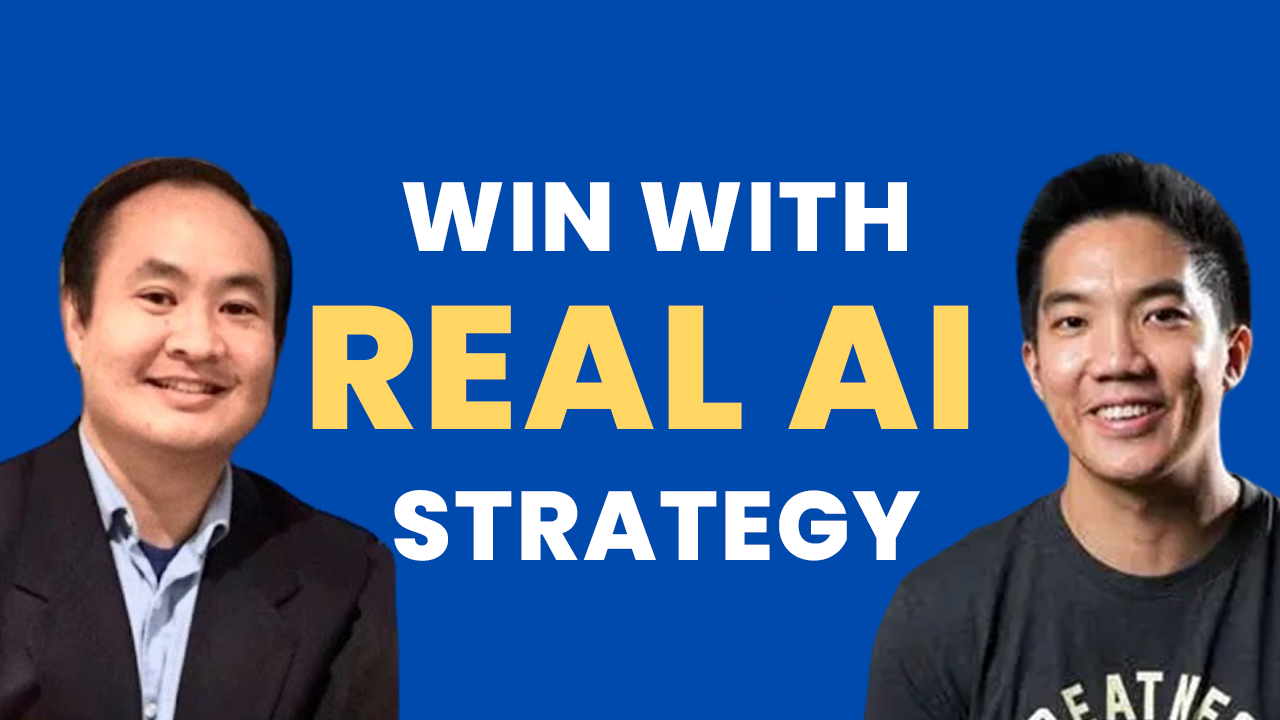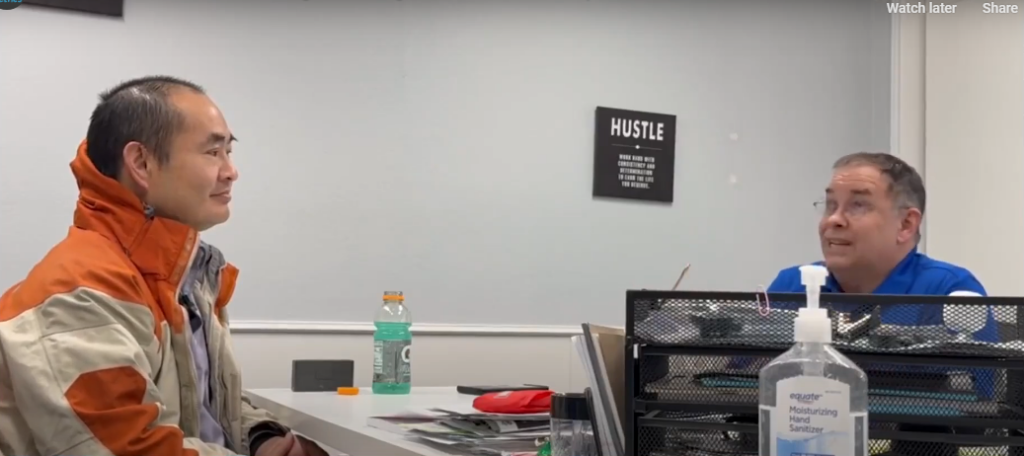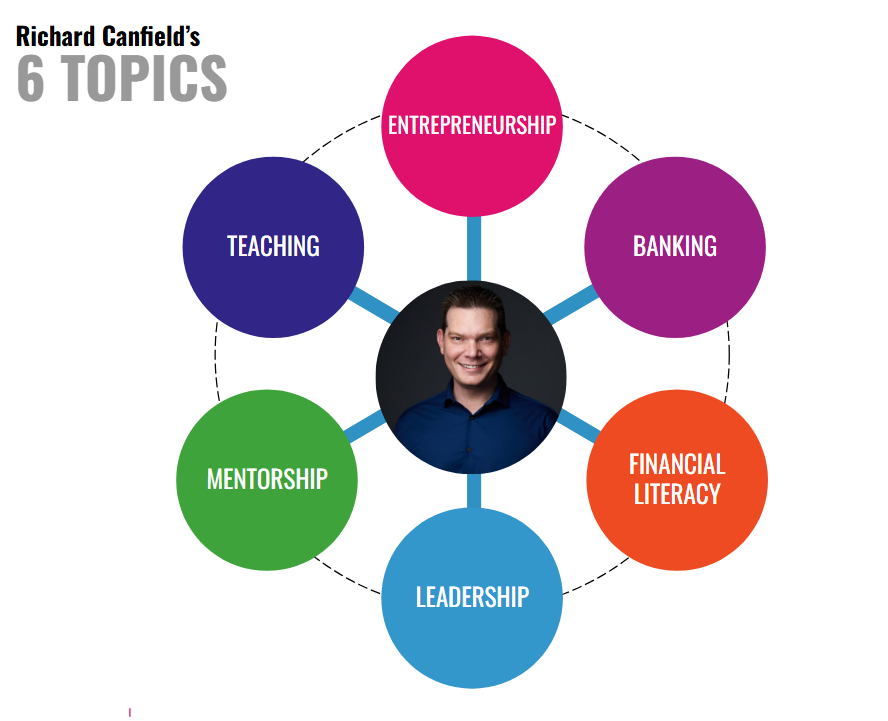
When I first met Melvin Soh in Singapore, I knew he wasn’t your average marketer. Between karaoke, deep talks about legacy, and laughter over dinner with our friend Elliot Drake, one thing became clear — Melvin is the real deal.
So when we sat down to talk about AI — a topic filled with hype and shortcuts — Melvin’s take cut through the noise.

Why Most People Will Fail with AI (And How Not to Be One of Them)
As Melvin put it, “The more AI, the more real becomes important.” AI exposes the quality of your foundation. It highlights what’s already there—whether that’s solid experience or a lack of substance. And if you’re building on shaky ground, all you’re doing is exposing the cracks faster.
If you’re a bad VA, a mediocre copywriter, or an agency owner who coasts through client work, then yes—AI will replace you. That’s not because AI is out to get you. It’s because it’s faster and better at doing work that lacks depth.
But for those with real client wins and documented proof, AI is a lever. It helps scale what already works.
This is just like the early days of the internet, when people thought marketing automation tools or Gmail would kill jobs. What actually happened? They created more opportunities for those who knew how to use them.
The One Thing AI Can’t Fake: Experience
Google’s EEAT framework added that extra “E” for a reason: Experience. It’s the differentiator now. Search engines are filtering out generic content. What they want is evidence—content grounded in real-world actions.
Let me put it this way: if you’re a top real estate copywriter in Singapore and have real relationships with agents in that market, your work should reflect it. You should have videos, testimonials, podcasts—things that prove you’ve been there, done that.
I remember meeting Melvin in Manila, Philippines, where we had dinner together with Dan Ulin after Melvin had recorded a podcast with me. That evening, we were also joined by our talented copywriter friend Colleen Mae Dela Cruz. It was a food-filled night of deep conversation, laughter, and meaningful exchange, not the kind of surface-level stuff you get from email threads or LinkedIn posts. That kind of face-to-face connection, captured in real moments, is what gives your content weight.

Photos, videos, and timestamps tied to actual locations and people—that’s what builds trust online. I’ve documented my work for over a decade, knowing that this kind of footprint matters.
If You’re Focused on AI Tools, You’re Already Losing
“People are just really lazy,” Melvin said. “The way AI is sold now is: you don’t have to lift a finger. Never need to work again. It just runs the whole business for you.”
That mindset is dangerous. It breeds complacency and fake confidence.
Melvin nailed it again when he said, “You use AI in integration with the human.” That kind of thinking leads people to miss the real value—how tools can support meaningful work, not replace it.
You’ll know someone’s faking it when all they talk about is the latest AI prompt or feature. They rarely show real results.
Melvin said it well: AI should enhance what’s already true. Do not generate something from thin air.
Here’s a simple test: ask them to show you how they’ve used AI to drive traffic, build an audience, or generate revenue. Not how many prompts they’ve bought.
And let’s be clear—having the latest tool doesn’t make you an expert. Think of it like this: you don’t become a heart surgeon by buying the newest scalpel. If I’ve done zero surgeries and only watched tutorials, but I’m using the latest tool, am I better than the experienced surgeon using last year’s scalpel? Of course not.
The same goes for AI. It’s not about the gear but about the skill behind it. AI only works when it’s in the hands of someone who knows what they’re doing.
How to Make AI Sound Human: Use It to Listen, Not Just Talk
“You use AI as an amplifier of authentic, not a creator of synthetic,” Melvin said. That mindset shift changes everything. AI should act like a smart team member, helping you process and present what you’ve already lived and documented.
He also emphasized that people are outsourcing thinking to AI, saying, “People think the AIs will do the thinking for me, so I don’t have to think.” That’s where people go wrong. Critical thinking still matters—more than ever.
Most people think of AI as a content machine. I use it to complete and enhance work rooted in real stories.
Let’s say I’ve recorded a course. I feed that to AI and ask it to generate a quiz. Or I hand it a podcast transcript and ask for highlights that sound human, not robotic. The inputs are real. The output just saves time.
A great example is when I had a podcast session with Richard McClure, the owner of Fox Air and Heat. We didn’t write up a blog post from scratch. Instead, we fed the AI a transcript of our conversation, and it pulled out the most powerful insights about Richard’s experience—how he built trust with customers, his local expertise, and the personal stories behind his brand.
The result sounded like Richard, not a machine. That’s what makes AI valuable.

Want AI to Work for You? Start with a Topic Wheel
If you know what you do, who it’s for, and the results you’ve gotten, AI becomes your team of expert VAs.
Take my buddy Richard Canfield as an example. One of the core topics on his Topic Wheel is financial education. He’s hosted guests on his podcast to explore key themes like overcoming adversity, building generational wealth, and financial independence.

In one standout interview, he brought on Kim Butler, an experienced financial strategist and a long-time friend of mine, to discuss “Overcoming Financial Difficulties and Redefining Retirement.” We helped Richard convert that rich, personal conversation into a full-length article using tools like Descript and ChatGPT.
Because the source content was real—grounded in experience and deep thinking, the AI didn’t just summarize. It enhanced the narrative while keeping the human voice intact. That’s how the Topic Wheel framework ties into AI: start with substance, then let the machines help scale it.
When you’ve mapped out your Topic Wheel—built around your core offer, customer wins, and supporting stories—you can plug those into AI and scale with confidence.
If you don’t have clarity or proof, AI will just make the confusion louder.
If You Died Tomorrow, Would AI Know What You Stood For?
If tomorrow were your last day, and someone hit play on your final recorded message, what would it say?
That message reflects your clarity and your values. That’s what you feed into AI. That’s how you scale impact.
This mindset came from a friend of mine, Caleb Guilliams (CEO, BetterWealth). He helps people define their legacy through a simple exercise: What do you want played at your funeral? That level of clarity changes how you use every tool, including AI.
Melvin gets this. That’s why I’m excited to work with him more. He’s not about surface-level hype. He cares about asking better questions, building trust, and using technology to make the truth louder.
I want to take a moment to publicly thank Melvin for his influence on my thinking and on the people we serve. His insistence on authenticity and depth has sharpened our own Content Factory process.
Working with Melvin reminds me that technology is only as powerful as the values you bring to it. If you’d like to learn more from him directly, check out his work at MelvinSoh.com and connect with him on LinkedIn.
I’m honored to learn from him, collaborate with him, and watch how he continues to set the bar for what it means to win with real AI strategy.
- AI exposes what you bring to the table: It reveals strengths as easily as gaps. Strong fundamentals get elevated—weak ones get amplified in the wrong direction.
- Experience matters more than ever: Google’s E-E-A-T rewards real-world expertise. Record your work, capture your moments, and let your story anchor your authority.
- Tools don’t matter without skill: Don’t chase prompts or plugins. Master your craft. The best tools won’t save poor execution.
- Use AI to amplify, not invent: Feed it something real—transcripts, photos, conversations—and let it help you refine, not create from scratch.
- Your Topic Wheel is your AI roadmap: Define your core topics, supporting stories, and client wins. That’s what AI can scale meaningfully.
- Clarity is the real unlock: Know your why, your audience, and your legacy. AI can’t answer those questions for you, but it can help you share the answers at scale.
Got a story that shows how AI helped you scale real experience? Drop it in the comments—I’d love to see what’s working for you.
